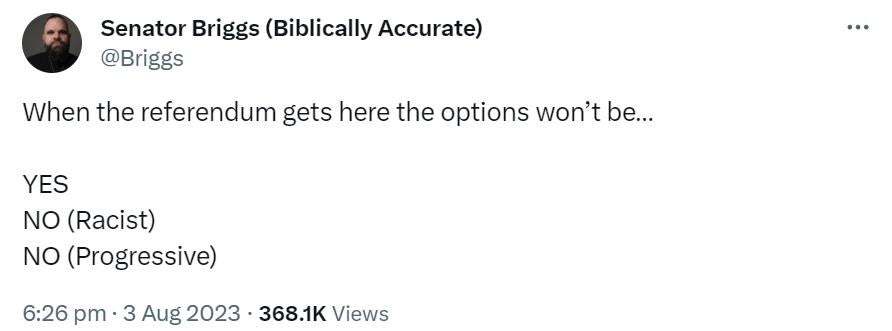The lead up to the The Voice Referendum has been an absolute shitshow. Disinformation has been rife in the conservative No campaign – including in the AEC official referendum booklet.
It has further highlighted the poisoned state of our information ecology. Daniel Schmachtenberger describes a polluted information ecology as the condition in which “we can’t trust that most of the information coming in is true and representative of reality and will inform good choice making”
It can be so tiring and disheartening to witness bad faith arguments and blatant disinformation, especially when all Australian citizens have a very important choice to make.
Following is my perspective on four different campaign groups and why I think voting Yes to The Voice is meaningful and important.
Progressive Yes campaign
Aboriginal and Torres Torres Strait Islander people as the First Peoples of Australia deserve constitutional recognition.
The idea for The Voice emerged out of the Uluru Statement of the Heart in 2017:
“We seek constitutional reforms to empower our people and take a rightful place in our own country. When we have power over our destiny our children will flourish. They will walk in two worlds and their culture will be a gift to their country. We call for the establishment of a First Nations Voice enshrined in the Constitution.”
Although it’s not a perfect analogy, I think it’s useful to compare the The Voice referendum to the 2017 marriage equality plebiscite. It is wrong that LGBTQ+ people were unable to get married in Australia before 2017. Marriage is an institution that many people disagree with but even if you disagree with the institution, LGBTQ+ people deserve the right to get married.
It is wrong that First Nations people have been excluded from the constitution for 122 years. Even if you disagree with the existence of the constitution or have valid criticisms of the political system, Aboriginal and Torres Torres Strait Islander people deserve a voice within the current system.
Achieving marriage equality did not end homophobia but it was a step in the right direction. Similarly, Constitutional Recognition and The Voice committee will not achieve reconciliation but it is step in the right direction. More importantly within the current cultural zeitgeist, a Yes victory in the referendum will not be a backwards step in the struggle for Indigenous Rights.
Progressive No campaign
It makes sense then, that the main argument coming from the progressive No side is that The Voice is not enough. The Uluru Statement of the Heart calls for three things: voice, treaty and truth. Some people in the progressive No campaign seek treaty and truth-telling before, or instead of, The Voice.
People in this camp are also sceptical about whether the government would actually follow the advice of The Voice committee. This is understandable and is in part due to the lack of meaningful change following the Royal Commission into Aboriginal Deaths in Custody in 1992, and the Bringing Them Home report in 1997.
However, some Indigenous people who were originally part of the progressive No campaign have changed to a Yes vote after recognising the racism that is present in the discourse and the subsequent consequences of a No victory.
One example is Indigenous activist Tarneen Onus Browne, who is one of the organisers of Warriors of the Aboriginal Resistance (WAR) in Naarm, Melbourne. In a recent interview, Onus Browne stated,
“The racist No campaign is dangerous in so many ways and it has made it OK for neo-Nazis to go out onto the streets of Melbourne – and it’s important for this country to send a message to them by writing Yes in the upcoming referendum.”
The progressive No campaign conceives of The Voice as a symbolic, and thus meaningless, gesture. However, The Voice has become increasingly meaningful precisely because of what it symbolises within Australian discourse at this moment in time.
A victory for No will not empower First Nations People or pave a smoother path towards achieving more radical actions such as a treaty.
As Indigenous elder and leader, Noel Pearson, writes “I cannot see how reconciliation will be a viable concept in Australia if the referendum fails. It will be shattered by such a failure, and it would be naive to think otherwise.”
A No victory will shift the Overton window further to the right and embolden the right-wing racists who have been campaigning in the hope of this outcome.
Conservative No campaign
The conservative motive is right there in the name. Conservatives seek to conserve the status quo and maintain structures of oppression. They do not want to see any progress in the direction of Aboriginal Rights.
The right have united on their chosen rhetoric in campaigning against The Voice. Their favoured claim is that constitutional recognition for Indigenous people is “divisive.” It is patently absurd to claim that the inclusion of a group of people is divisive. However, the word divisive is appropriate in the context of constitutional exclusion and racism.
Unsurprisingly, conservative figures such as Pauline Hanson, Peter Dutton, and John Howard have been actively campaigning against The Voice. Hanson, Howard and Dutton have all demonstrated multiple counts of anti-immigration and anti-Indigenous racism throughout their political careers. Let’s take a look at some of their specifically anti-Indigenous racism:
Pauline Hanson has a long history of being the face of racism in Australia. In 2020, Hanson criticised the Closing the Gap campaign, stating,
"The biggest problem facing Australian and Aboriginal Australians today is their own lack of commitment and responsibility to helping themselves."
Hanson went on to say,
"When you spend billions of dollars a year on any group of people you expect outcomes but sadly those billions have gone to the non-productive, unrepentant aboriginal industry."
John Howard famously refused to apologise for the heinous acts and impacts of the Stolen Generation during his reign as prime minister.
When Kevin Rudd apologised for these injustices in 2008, Peter Dutton boycotted the apology. Last year, Dutton apologised for walking out of the formal parliament apology stating:
“I failed to grasp at the time the symbolic significance to the stolen generation of the apology.”
Indigenous Australians minister, Linda Burney has encouraged Peter Dutton and others who boycotted the 2008 apology not to repeat the mistakes of the past in the upcoming referendum.
Further, in an attempt to gain more support for a No vote, conservatives have been shamelessly co-opting progressive No campaign arguments. In bad faith, Hanson and Dutton have both argued that The Voice will not support First Nations People. They have also both claimed to care about outcomes for Indigenous people. Yet their track record suggests otherwise.
The conservative campaign showed its cards in the No segment of the official referendum booklet which stated:
“Some Voice supporters are upfront in saying this Voice will be a first step to reparations and compensation and other radical changes.”
In this way, conservatives claim that The Voice is both not good enough and too radical. Conservatives do not oppose The Voice out of any genuine desire to see improvement in the lives of First Nation People. They do not want to cede any ground at all.
Conspiratorial No “campaign”
Ever since mask mandates and lockdowns have lifted, the Q-pilled among us have been in search of a new conspiracy to connect over. These are the people that have been hurtling down the new age to right-wing pipeline since the start of the pandemic.
Unfortunately and unsurprisingly, they have projected their desire for a shiny new conspiracy theory onto the upcoming referendum.
I put “campaign” in quotations because this group is certainly the least cohesive of all the camps. They have co-opted arguments from the conservative No, the progressive No, and a special third place, that they like to attribute to their intuition but actually comes from their Facebook and Telegram conspiracy groups.
Here are a few views about the referendum that come from this camp:
- The referendum is part of globalist agenda called the great reset.
- Voting yes will make Indigenous people citizens of the corporation that is the Australian government which is owned by the US.
- The Voice referendum has been concocted by a foreign intelligence agency.
- Voting yes will lead to totalitarianism and a New World Order (NWO).
One of the proponents of the NWO conspiracy is Widjabul woman, Cindy Roberts. A photo of Roberts was being shared and reshared among this camp of her holding a sign that said ‘Tribal People say No to The Voice”. (It really should not have to be said, but there are Indigenous people in every campaign position, so this photo is not the slam dunk they believed it to be – especially in consideration of the YouGov poll which showed that 83% of Indigenous people support a Yes vote.)
In a tweet replying to this famous photo of Roberts, Yorta Yorta rapper Adam Briggs wrote:
“[Roberts] also said the referendum is place so the UN can finally enact NOW and complete the takeover of Australia.”
I double checked this claim and indeed at 6:13 of this video, Roberts claims the government is attempted to “roll out their New World Order.” Little wonder then, that the conspiratorial No group latched onto Cindy Roberts.
The general sentiment in this group is “Nothing is as it seems.” Unfortunately, this level of distrust lends itself to hyper-individualistic and right-wing populist political views. William Callison and Quinn Slobodian coined the term ‘Diagonalism’ to describe this eclectic movement and their unwitting protest against coherent collective action.
Callison and Slobodian write that diagonalists tend to “express ambivalence if not cynicism toward parliamentary politics, and to blend convictions about holism and even spirituality with a dogged discourse of individual liberties. At the extreme end, diagonal movements share a conviction that all power is conspiracy.”
As Naomi Klein points out in her recent book, Doppelganger, the conspiracy theorists among us tend to get the feelings right, but the facts wrong.
The Conspiratorial No crowd is right to feel that there is something unjust or untrustworthy about the structure of our society. They have their finger on the pulse when they feel a sense of loneliness and exploitation. However, alienation and inequality do not emerge from the New World Order. Rather, they are inevitable products of capitalism. I’m sorry, I know it’s less exciting. (Or maybe it’s not, read Capitalist Realism by Mark Fisher!)
In any case, the conspiracy theorists have further muddied the water in the lead up to the referendum.
In sum, the Voice Referendum and it’s relatively moderate proposal should have been a shoe in. Instead, the nationwide discourse around Indigenous Rights has emboldened racists, awakened the conspiritualists, and been leveraged by right-wing conservatives for their own political gain.
Despite the modest nature of the Voice proposal, voting Yes has become increasingly more important in light of its conniving right-wing adversaries. Those who want to fight inequality and racism have an opportunity to leverage their shared values in a meaningful way on October 14th. Vote yes.
…
TL;DR: Vote Yes in the referendum. When the votes are counted no one will be able to decipher between a progressive, conservative, racist, or conspiratorial No.

Further Reading
I highly recommend Jordan Humphreys’ article, Why the left should vote Yes in the referendum
